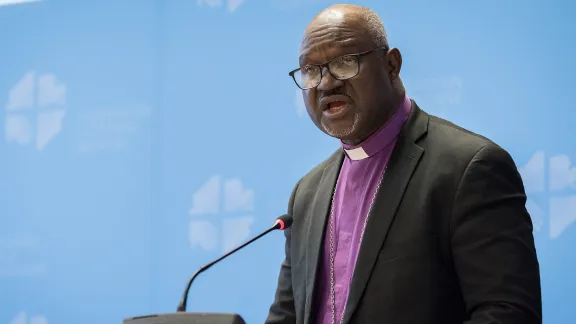
LWF President Archbishop Dr Panti Filibus Musa. Photo: LWF/A. Hillert
Grateful for churches carrying “each other’s burdens” and providing support during pandemic
(LWI) - The Lutheran World Federation (LWF) President Archbishop Dr Panti Filibus Musa has urged all member churches to be witnesses of “radical hope” as they look forward to the next Assembly to be held in Krakow, Poland in 2023. In an address to the LWF Council, which is meeting online from 18-23 June, he calls on all leaders and congregations to remain true to the founding vision of the global communion of churches to “rebuild justice, peace and reconciliation in this broken world.”
Reflecting on the theme of the forthcoming Assembly, ‘One Body, One Spirit, One Hope’, the LWF leader stresses the “oneness of our world, of the human family, of the one body” into which Christians are called through Baptism. Like the first disciples, he says, “we have been drawn by the power of the Holy Spirit who creates, reconciles and renews" to “open up our lives for the transforming presence of God in our world.”
Steered by the power of the Spirit, he continues, “we have one hope” in the knowledge of “what God has done already” through the Cross and Resurrection and “what God is still doing among us”. At the end of each day, in our different ministries in countries around the world, he says: “Let that be our question [….] have I passed on the hope which I received in Christ?”
Committed to care for church and world
Comparing the current state of the world to the situation in 1947 when the LWF was founded, Musa says there are many similarities, “much devastation” driven by hate and injustice to one another. Today, he says, this is compounded by a pandemic that has taken lives, traumatized communities, destroyed economies. Hate speech, racism, fundamentalism, autocratic and oppressive leadership styles, exclusion and inequality are on the rise, he notes. Hard won rights are being curtailed, with women suffering the most from this backlash, he adds.
But just as churches, gathered in the aftermath of the Second World War, committed themselves to being signs of radical hope in their day, so the LWF is called in the current context to live out that same commitment “to care for the church and for the world.” In his address to Council members, the LWF president expresses gratitude for all the churches have done since the start of the pandemic to carry “each other’s burdens” and stand together in the face of fears and anxieties. “This is what I would call a sign of radical hope,” he says.
Let us remain steadfast in our vocation to serve those at the margins.
As the virus continues to cause devastation in the lives of those at the margins of society, Musa says, the LWF must continue to combat inequality, individualism and nationalism. When a large section of the world goes without vaccinations, he says, we must speak out against inequality, because until all are safe, no one is. Churches must “remain steadfast in our vocation to serve” the poor and the marginalized. “We are one human family,” he insists, and “only as one will we prevail.”
In conclusion, the archbishop thanks outgoing LWF General Secretary Rev. Dr Martin Junge for his “selfless service and commitment” to the global communion of churches. He praises members of the Search Committee for their work in selecting candidates for Junge’s successor and he urges Council members to continue working together to “enable us to become a sign of radical hope in our world.”
LWF/P. Hitchen
The 18 to 23 June LWF Council meeting will take place online, in view of restrictions imposed because of the COVID-19 pandemic. The LWF Council normally meets in person every year, and is the highest authority of the LWF between assemblies. It consists of the President, the Chairperson of the Finance Committee, and 48 members from LWF member churches in seven regions.


